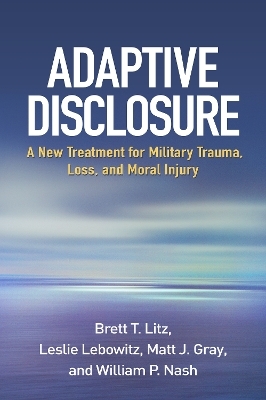
Adaptive Disclosure
Guilford Press (Verlag)
978-1-4625-3383-1 (ISBN)
Brett T. Litz, PhD, is Professor in the Departments of Psychiatry and Psychology at Boston University and Director of the Mental Health Core of the Massachusetts Veterans Epidemiological Research and Information Center at the VA Boston Healthcare System. He is also Assessment Core Director of the STRONG STAR Consortium and the Consortium to Alleviate PTSD. Dr. Litz focuses on evaluating the mental health outcomes associated with military deployments across the lifespan, with an emphasis on early intervention and treatments for combat and operational trauma, loss, and moral injury. Leslie Lebowitz, PhD, is a clinical psychologist in private practice in Newton Center, Massachusetts. She consults extensively in forensic contexts and provides training in the area of trauma in both community and military settings. Dr. Lebowitz developed the psychological portion of the curriculum for training Air Force Sexual Assault Response Coordinators and continues to do biannual training for the Air Force. Her research focuses on the psychological meaning of trauma and the implications for treatment. Previous research examined the aftermath of sexual violence, and more recent work addresses traumatic loss and moral injury. Matt J. Gray, PhD, is Professor of Psychology at the University of Wyoming. His research focuses on treatment development for broad emotional and psychological impacts of combat, as well as prevention and treatment of sexual violence and intimate partner violence. Dr. Gray has published numerous articles in peer-reviewed journals. He has received the Extraordinary Merit in Research Award and the Outstanding Psychology Faculty Member Award on multiple occasions from the University of Wyoming. William P. Nash, MD, is Director of Psychological Health for the U.S. Marine Corps. While on active duty in the Navy, Dr. Nash was deployed to Iraq with Marines of the 1st Marine Division during the Second Battle of Fallujah. His current interests focus on the prevention, recognition, and treatment of combat and operational stress injuries, including moral injury. He is coeditor of Combat Stress Injuries: Theory, Research, and Management and founding chair of the Military Committee of the Group for the Advancement of Psychiatry.
1. Introduction
2. Background and Evidence
3. Military Culture and Warrior Ethos
4. Guiding Principles of Adaptive Disclosure
5. Assessment, Case Conceptualization, and Treatment Planning
6. Beginning Adaptive Disclosure: Session 1
7. The Exposure Component: Active Treatment Sessions 2 to 7
8. Breakout Components for Loss and Moral Injury: Active Treatment Sessions 2 to 7
9. Ending Treatment and Planning for the Future
10. Using Adaptive Disclosure when Prior Complex Trauma is Present
Appendix 1. Diversity of Military Missions, Organizations, and Relationships
Appendix 2. The Meaning and Implication of Key Events
Appendix 3. Calming and Attention Focusing Techniques
References
Index
| Erscheinungsdatum | 30.11.2017 |
|---|---|
| Verlagsort | New York |
| Sprache | englisch |
| Maße | 152 x 229 mm |
| Gewicht | 320 g |
| Themenwelt | Geisteswissenschaften ► Psychologie ► Biopsychologie / Neurowissenschaften |
| Medizin / Pharmazie ► Medizinische Fachgebiete ► Notfallmedizin | |
| Medizin / Pharmazie ► Medizinische Fachgebiete ► Psychiatrie / Psychotherapie | |
| Medizin / Pharmazie ► Studium | |
| Sozialwissenschaften ► Pädagogik ► Sozialpädagogik | |
| Sozialwissenschaften ► Soziologie | |
| ISBN-10 | 1-4625-3383-3 / 1462533833 |
| ISBN-13 | 978-1-4625-3383-1 / 9781462533831 |
| Zustand | Neuware |
| Haben Sie eine Frage zum Produkt? |
aus dem Bereich


